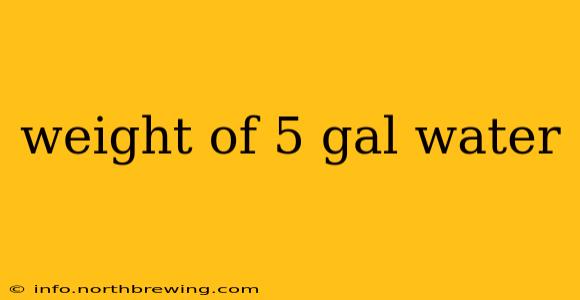Water is essential for life, and understanding its weight is crucial in various applications, from plumbing to agriculture to everyday tasks. This guide will delve into the weight of 5 gallons of water, considering various factors that can influence the final figure.
Understanding the Basics: Weight vs. Mass
Before we jump into the weight of 5 gallons of water, let's clarify the difference between weight and mass. Mass is the amount of matter in an object, while weight is the force of gravity acting on that mass. Since gravity varies slightly depending on location (e.g., altitude), the weight of an object can fluctuate, while its mass remains constant. For most practical purposes, we'll use the terms interchangeably, understanding that slight variations might occur.
What is the weight of 5 gallons of water?
The weight of 5 gallons of pure water at standard temperature (62°F or 16.7°C) and atmospheric pressure is approximately 41.7 pounds (lbs) or 18.9 kilograms (kg). This is a commonly used figure and a good starting point for most calculations.
What factors affect the weight of 5 gallons of water?
Several factors can subtly alter the weight of 5 gallons of water:
1. Temperature:
Water density changes with temperature. Colder water is denser, meaning it weighs slightly more per gallon than warmer water. While the difference might seem negligible for everyday calculations, it becomes significant in scientific and industrial applications.
2. Purity:
Impurities dissolved in the water, such as salts and minerals, increase its overall mass and therefore its weight. Ocean water, for example, is denser than freshwater due to its salt content and thus would weigh more than 5 gallons of pure water.
3. Pressure:
Pressure also affects water density, though the effect is usually negligible in everyday situations. High-pressure environments, like deep ocean depths, will slightly increase the water's density.
4. Altitude:
While the mass remains the same, the weight of 5 gallons of water decreases slightly at higher altitudes due to lower gravitational pull. The difference is usually minimal unless you're at extremely high elevations.
How much does 5 gallons of water weigh in different units?
Here's a table summarizing the weight of 5 gallons of water in various units:
| Unit | Approximate Weight |
|---|---|
| Pounds (lbs) | 41.7 |
| Kilograms (kg) | 18.9 |
| Ounces (oz) | 667 |
How to calculate the weight of different volumes of water?
You can use the following formula to calculate the weight of different volumes of water:
Weight (lbs) = Volume (gallons) * 8.34 lbs/gallon
This formula uses the standard weight of one gallon of water (8.34 lbs). Remember to adjust this value based on the factors mentioned earlier if higher precision is needed.
What are some practical applications of knowing the weight of water?
Understanding the weight of water is crucial in many areas, including:
- Plumbing: Calculating water pressure and pipe sizing.
- Agriculture: Irrigation systems and water management.
- Construction: Estimating loads for structural components.
- Shipping: Determining vessel capacity and buoyancy.
- Emergency Preparedness: Planning for water storage and transportation during emergencies.
By understanding the weight of 5 gallons of water and the factors that influence it, you can make more accurate calculations and informed decisions in various situations. Remember to account for temperature, purity, and pressure when high precision is required.
